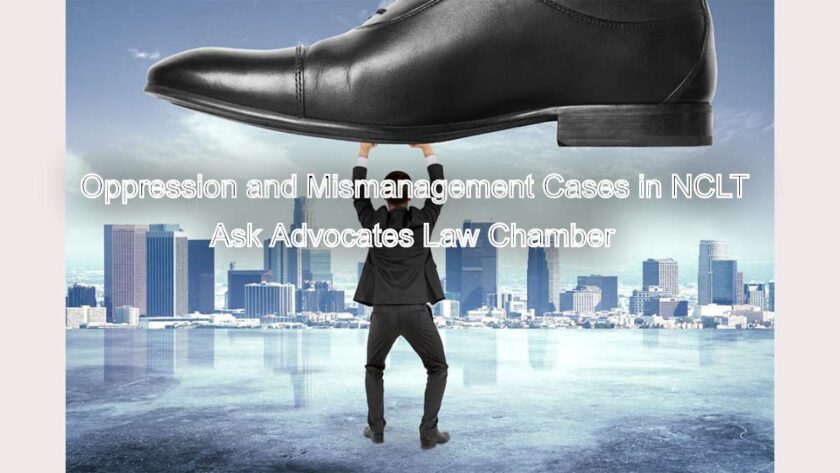The National Company Law Tribunal (NCLT) is a crucial body in India’s corporate legal landscape. It handles disputes related to company law. The NCLT was established to streamline corporate justice. It replaced the Company Law Board and the High Courts. The tribunal now has exclusive jurisdiction over many company matters. Consequently, it has become the primary forum for resolving issues of oppression and mismanagement. These cases are particularly significant. They often involve complex corporate structures and high stakes. The NCLT’s role is to provide a fair and efficient resolution. Indeed, its decisions have a profound impact on the future of companies. This article provides a legal roadmap. It guides stakeholders through the process of filing such cases. It outlines the legal framework, procedural steps, and key considerations.
A Legal Roadmap for Oppression and Mismanagement Cases in NCLT
What is Oppression?
Oppression occurs when the majority shareholders act in a manner that is burdensome, harsh, or wrongful to the interests of the minority shareholders. This conduct must be continuous. It should also be a clear departure from fair dealing. It is a violation of the principles of good faith. The action must be prejudicial to a member or members of the company. It can take many forms. For example, it might involve the denial of dividends. It could also be the removal of a director without a proper cause.
Furthermore, it might include the freezing out of minority shareholders. The key is that the conduct is harmful and persistent. It is not just a single act of corporate indiscretion. The law aims to protect the vulnerable. It ensures that the majority cannot abuse its power. In a broader sense, it is about corporate governance. It seeks to ensure fairness and equity. Consequently, the NCLT carefully scrutinizes such claims. It considers the company’s entire history and context.
What is Mismanagement?
Mismanagement, on the other hand, deals with the improper administration of a company’s affairs. It involves actions or inactions by the company’s management. These actions must be prejudicial to the company’s interests. They must also be harmful to the public interest. It is not about the internal conflict between shareholders. Rather, it concerns the way the company is run. Examples include fraudulent transactions. It could also involve the misapplication of company funds. Furthermore, it might be the siphoning of profits.
The company’s assets could also be sold at a significant undervalue. Such acts directly harm the company’s financial health. They also damage its reputation. The law recognizes that mismanagement hurts everyone. It harms shareholders, creditors, and the public. Therefore, the NCLT can intervene. It can take remedial actions. It may even remove the directors. The NCLT’s intervention is often a last resort. It is a powerful tool to protect a company’s integrity. It ensures that those in control act responsibly. The focus is on the company’s well-being.
Who Can File a Petition?
The law specifies who can file a petition for oppression and mismanagement. It is not open to just anyone. Section 244 of the Companies Act, 2013, sets out the eligibility criteria. First, a certain number of members must join the petition. If the company has a share capital, at least one hundred members are required. This group must also hold at least one-tenth of the company’s issued share capital. Alternatively, the petition can be filed by members holding at least one-tenth of the total voting power. The threshold is different for companies without a share capital. In such cases, at least one-fifth of the total number of members must file.
The central government can also file a petition. This happens when it believes there are grounds for action. This provision ensures that the NCLT hears genuine grievances. It prevents frivolous litigation. It is a balancing act. The law protects minority rights. At the same time, it prevents disruption to corporate functioning. Consequently, meeting these criteria is the first step. It is a jurisdictional prerequisite.
The Legal Framework: Sections 241 and 242
Sections 241 and 242 of the Companies Act, 2013, form the backbone of this legal framework. Section 241 gives a member the right to apply to the NCLT. This can be done if the member believes the company’s affairs are being conducted in an oppressive or prejudicial manner. It also covers cases of mismanagement. The NCLT, upon receiving such an application, may make an order. This is where Section 242 comes in. Section 242 grants the NCLT broad powers. It outlines the specific orders the tribunal can pass. For instance, it can regulate the company’s conduct in the future. It can also direct the purchase of shares of any members by others.
Furthermore, it can terminate, set aside, or modify any agreement. The NCLT can even appoint new directors. It can also order the recovery of undue gains. The scope of these powers is vast. It allows the NCLT to provide a tailored remedy. The primary goal is to bring an end to the matters complained of. The tribunal aims to prevent future harm. These sections work together. They provide both the right to a remedy and the means to enforce it. The NCLT’s discretion is key. It ensures justice is served.
The Petition: Drafting and Filing
The process begins with drafting a well-structured petition. The petition must clearly state the facts. It needs to provide a chronological account of the events. It should also specify the acts of oppression or mismanagement. The petitioner must provide all supporting documents. These documents can include board resolutions, financial statements, and email correspondence. The petition must also detail the relief sought. It should be specific about what the NCLT should do. For example, it might ask for an injunction against a particular action. It may also request the appointment of a special auditor. The petition is a formal pleading. It must adhere to the NCLT Rules, 2016.
It must be filed in the appropriate NCLT bench. A proper filing requires paying the prescribed fee. It also means providing copies to all respondents. The drafting is a critical stage. A weak petition will likely be dismissed. Therefore, legal expertise is essential. It ensures all legal requirements are met. It also strengthens the case on its merits. This is where a law firm like Ask Advocates provides invaluable support.
Interim Reliefs and Injunctions
Upon filing the petition, the petitioner can seek interim reliefs. These reliefs are temporary orders. They are meant to protect the petitioner’s interests while the case is ongoing. They are crucial in urgent situations. An interim injunction can stop the company from taking a specific action. For example, it can prevent the sale of a key asset. It can also halt a proposed change in the company’s shareholding. The NCLT grants such reliefs only in compelling circumstances. The petitioner must demonstrate a prima facie case. This means there is a strong possibility of success. The petitioner must also show that they will suffer irreparable harm. This harm would be difficult to compensate for later.
The balance of convenience must also be in the petitioner’s favor. In other words, the harm to the petitioner outweighs the harm to the company. The tribunal’s decision is based on these principles. Seeking interim relief is often a strategic move. It can prevent the respondents from causing further damage. It also puts pressure on the other party. The NCLT has wide powers to grant such reliefs. It ensures the status quo is maintained. This prevents the case from becoming infructuous.
The Hearing and Evidence
Once the petition is filed, a date is set for the hearing. The respondents must file their reply. They present their defense to the allegations. The petitioner can then file a rejoinder. This is a response to the respondent’s reply. The NCLT then hears the arguments from both sides. Evidence is presented. This can include oral testimony from witnesses. It also includes documentary evidence. The NCLT follows the principles of natural justice. It provides both parties with a fair opportunity to be heard. The burden of proof is on the petitioner.
They must prove their allegations of oppression or mismanagement. The tribunal also has the power to appoint experts. It can appoint a special auditor or an investigator. This can help in uncovering hidden facts. The proceedings are quasi-judicial. They are less formal than a court trial. However, the legal principles remain the same. The NCLT’s decision is based on the facts and the law. It considers all the evidence presented. A thorough preparation is key to success.
FAQs on Oppression and Mismanagement Cases in NCLT
Oppression refers to the majority shareholders’ acts that are burdensome or wrongful to minority shareholders. It’s about a conflict of interest between shareholders. Conversely, mismanagement involves the improper administration of a company’s affairs by its management, which harms the company itself and the public interest.
A petition can be filed by a certain number of members based on the company’s structure. For a company with share capital, it requires at least 100 members or members holding at least one-tenth of the issued share capital. For companies without share capital, at least one-fifth of the total members can file.
The NCLT has broad powers. It can regulate the company’s future conduct, direct the purchase of shares, set aside agreements, or even appoint new directors. The tribunal’s primary goal is to bring an end to the wrongful conduct and prevent future harm to the company and its members.
Yes, a petitioner can seek interim reliefs or injunctions. These are temporary orders to protect the petitioner’s interests and prevent further damage. The NCLT grants such reliefs if the petitioner can demonstrate a strong case and prove they would suffer irreparable harm without the order.
No, the NCLT’s decision can be appealed. An appeal against a tribunal order can be made to the National Company Law Appellate Tribunal (NCLAT). Subsequently, a further appeal on a point of law can be filed with the Supreme Court of India.
Remedial Orders and Conclusion
The NCLT, after hearing the matter, delivers its judgment. The orders passed are often comprehensive. They are meant to resolve the underlying dispute. The NCLT can pass a wide range of orders. For instance, it can order the company to buy back the petitioner’s shares. It can also remove and replace the management. It might even appoint a new board of directors. The tribunal can also modify the company’s articles of association. In some cases, it can order a winding up of the company. However, this is a last resort. The NCLT prefers to keep the company as a going concern. The objective is to provide a practical solution. The orders are designed to prevent future oppression. They aim to restore good corporate governance.
The NCLT’s decisions are subject to appeal. An appeal lies with the National Company Law Appellate Tribunal (NCLAT). Subsequently, a further appeal can be made to the Supreme Court. The entire process requires careful navigation. The legal landscape is complex. Therefore, proper legal guidance is indispensable. Ask Advocates Law Chamber has the expertise. We can guide you through every step. We ensure your rights are protected. In conclusion, the NCLT provides a robust mechanism. It is a powerful tool against corporate wrongdoing. It ensures justice for all stakeholders.
Read More
- IBC Cases in Chennai NCLT: What Creditors and Debtors Must Prepare For
- Industrial Pollution & Environmental Clearance Violations: A Guide to NGT Proceedings
- Suspension of Government Servants: CAT Case Strategies That Work
- How NGT is Shaping Chennai’s Lakes, Marshlands, and Coastal Projects
- What to Do When a Bank Files a Case in DRT? Your Legal Options
- National Company Law Tribunal (NCLT):



